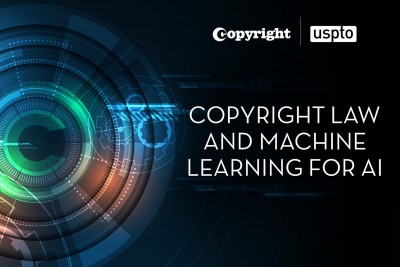Register now to hear experts from the United States Patent and Trademark Office (USPTO) and the U.S. Copyright Office lead discussions on ground-breaking policy issues related to copyright law and artificial intelligence (AI). During the course of this free, half-day program, three sessions will examine:
- machine learning in practice
- how existing copyright laws apply to the training of AI
- what the future may hold in this fast-moving policy space
Whether you are a copyright attorney, a policymaker, or anyone else interested in how AI is affecting rights holders, you do not want to miss this public program.
Agenda
(All times in ET)
Agenda subject to change
| 10–10:05 a.m. | Welcome and opening remarks Maria Strong, Associate Register of Copyrights and Director of Policy and International Affairs |
| Part I: The present | |
| 10:05–11:05 a.m. | Machine learning in practice After a brief introduction to machine learning as a distinct subfield of AI, speakers will share examples of creators, technology companies, and researchers using machine learning. Through these examples, the panelists will describe and discuss the compilation of a learning database, intermediate copying in the learning process, and the output of machine learning. The presentations will serve as the factual background for the second panel discussion. Following 50 minutes of moderated discussion, there will be a 10-minute Q&A period. Moderator: Panelists: |
| 11:15 a.m.–12:15 p.m. | How existing copyright regimes address issues relating to machine learning This panel will explore how the U.S. and other copyright regimes address issues relating to machine learning, including what rights are implicated and what exceptions may apply. It will also address approaches to protection of data that does not qualify for copyright protection, as well as existing practices with respect to licensing of content used in machine learning. Following 50 minutes of moderated discussion, there will be a 10-minute Q&A period. Moderator: Panelists: |
| 12:15–1:15 p.m. | Break |
| Part II: The future | |
| 1:15–2:15 p.m. | What’s next? This panel will evaluate the adequacy of the existing legal regimes to achieve the appropriate balance in regulating issues involved in the input and use of third-party content in machine learning. It will consider alternative solutions, including expanded exceptions and limitations, collective licensing and/or remuneration rights, and sui generis data protection. Following 50 minutes of moderated discussion, there will be a 10-minute Q&A period. Moderator: Panelists: |
Note: Statements made by non-federal employees at this event do not reflect the position of the U.S. government.
Additional information
Important note: The organizers of this program plan to present it in a hybrid format, both live and online, with all sessions on Zoom. The on-site option will depend on pandemic-related conditions and public access to the Library of Congress at the time of the event, and could be subject to cancellation on short notice should conditions change. Whether planning to attend online via Zoom or in-person, all attendees must register in advance.
For more information, visit the registration page or contact Andrew Foglia at the U.S. Copyright Office.


